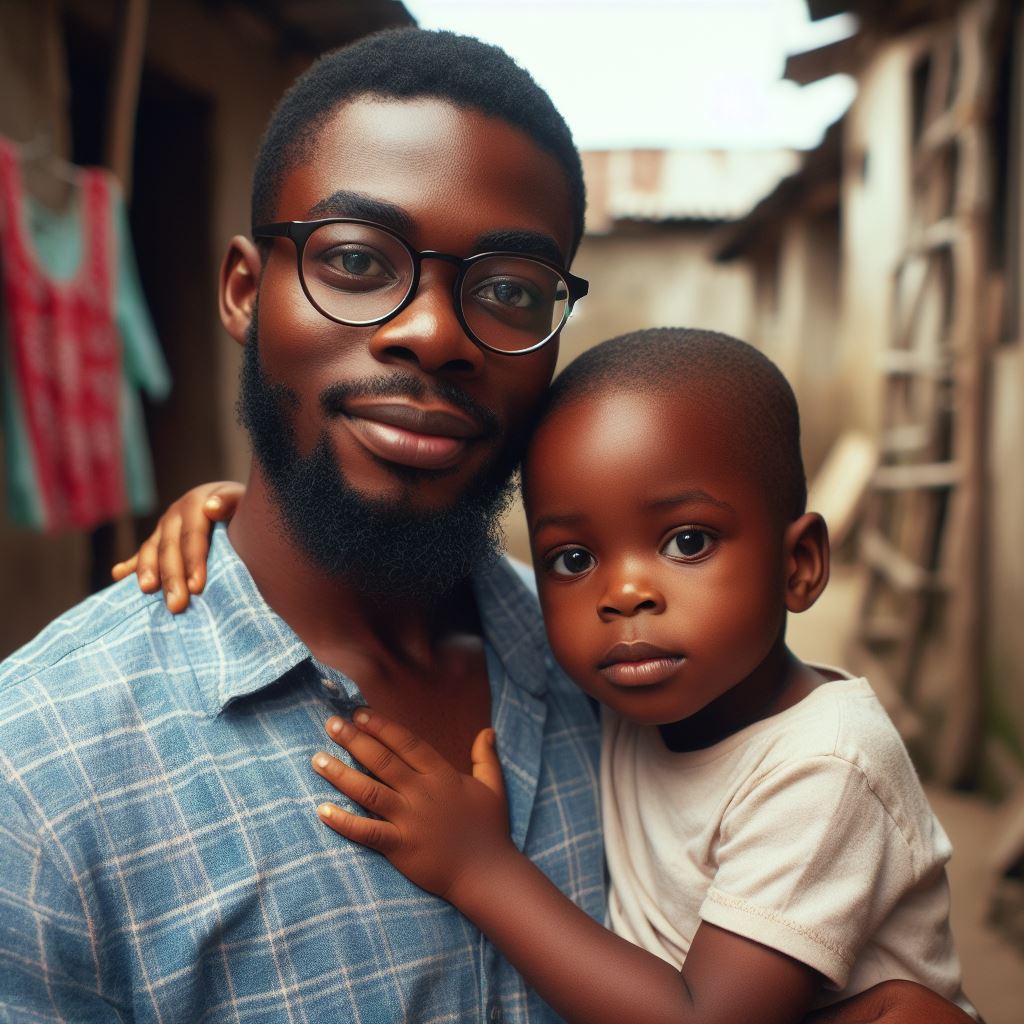Introduction
The transition from husband to father marks a pivotal shift in a Nigerian man’s existence.
Within the vibrant tapestry of Nigerian society, this metamorphosis holds deep-rooted cultural and societal implications.
Understanding this transition is paramount to comprehend the multifaceted roles and expectations placed upon men within Nigerian communities.
Nigeria, with its diverse cultural heritage and rich traditions, imposes distinct roles on men.
As a husband, the man carries responsibilities deeply embedded in providing for the family and upholding familial honor.
However, as he evolves into a father, a new dimension of responsibilities and expectations dawns upon him, reflecting societal values and norms.
This blog seeks to unravel the complexities intertwined within this transition.
From the moment a man embraces fatherhood, societal perceptions and familial dynamics shift.
Understanding these changes is essential not only to appreciate the individual journey but also to comprehend the societal structures shaping masculinity in Nigeria.
Throughout this exploration, we’ll delve into the cultural nuances that influence a Nigerian man’s transformation.
We’ll dissect societal expectations, familial pressures, and the emotional evolution experienced during this transition.
By shedding light on this journey, we aim to foster deeper comprehension and appreciation for the Nigerian man’s path from husband to father.
In essence, this blog strives to illuminate the intricacies, challenges, and significance encapsulated within this transformative phase.
Join us on this insightful expedition as we navigate through the multifaceted layers of the Nigerian man’s evolution, from devoted husband to nurturing father.
Traditional Gender Roles in Nigeria
Traditional gender roles assigned to men within Nigerian households
- Typically, Nigerian households expect men to actively serve as the family breadwinners.
- They are responsible for providing financially for the entire household, including their wives and children.
- Men are also expected to be strong, authoritative figures who make important decisions for the family.
- They are seen as the head of the household and their decisions are often unquestioned.
- Nigerian men are traditionally assigned the role of protector and provider for their wives and children.
- They are expected to ensure the safety and well-being of their families at all times.
- Men must actively engage in home repairs, maintenance, and yard work, meeting societal expectations.
- They are seen as the primary caregivers when it comes to disciplining and teaching their children.
- Nigerian men are expected to instill values and morals in their children, particularly their sons.
Expectations placed on men as husbands and fathers in Nigerian society
- As husbands, Nigerian men are expected to be loyal and faithful to their wives.
- They are expected to provide emotional support and companionship to their wives.
- Nigerian society often places the expectation on husbands to sacrifice for their wives’ well-being and happiness.
- Men are also expected to be actively involved in the raising and nurturing of their children.
- They are expected to spend quality time with their children and participate in their upbringing.
- Nigerian fathers are expected to be good role models for their children, especially their sons.
- They are expected to teach their children about responsibility, respect, and hard work.
- Nigerian men are also expected to be actively involved in the education and career choices of their children.
- Nigerian men, as husbands and fathers, must actively contribute to their families’ well-being and harmony.
Cultural and societal pressures men face when it comes to fulfilling these roles
- Nigerian men often face societal pressure to conform to traditional gender roles and expectations.
- They may face criticism and judgment if they don’t meet these expectations.
- The pressure to be the sole provider can be overwhelming, leading to stress and mental health issues.
- Men may face challenges in balancing their responsibilities as husbands, fathers, and providers.
- The fear of not meeting societal expectations can lead to feelings of inadequacy and insecurity in Nigerian men.
- Nigerian men also face cultural pressure to display masculinity and strength at all times.
- They may feel the need to suppress their emotions and vulnerability to conform to societal norms.
- The pressure to be a good role model can be daunting, as men may fear making mistakes and disappointing their families.
- It is important for Nigerian society to recognize and appreciate the efforts and struggles faced by men in fulfilling these traditional roles.
Read: The Do’s and Don’ts of Pregnancy Sex
Parenting Made Just for You
Get personalized Parenting Solutions tailored to your child’s needs. Transform your parenting journey with expert guidance in 1-3 days.
Get StartedThe Changing Role of Men in Nigerian Families
Influence of globalization and modernization on Nigerian families
- Globalization and modernization have brought significant changes to Nigerian families.
- The influx of Western ideas and values has challenged traditional gender roles.
- Men are now exposed to different cultural practices and concepts of gender equality.
- Access to technology and information has opened new opportunities for Nigerian families.
- Globalization has prompted a shift towards nuclear families and urbanization in Nigeria.
- Changing social norms and increased educational opportunities have influenced Nigerian men significantly.
- Modernization has led to a more individualistic mindset, impacting family dynamics.
- These changes have also created economic opportunities for both men and women.
How women’s empowerment has impacted men’s roles within the family
- Women’s empowerment has challenged traditional gender roles in Nigerian families.
- As women have gained more education and economic independence, power dynamics have shifted.
- Men are now sharing decision-making responsibilities with their partners.
- Women’s empowerment has led to a renegotiation of traditional household duties.
- Men are increasingly taking on domestic tasks previously seen as women’s responsibilities.
- There is a greater recognition of the importance of shared parenting and household responsibilities.
- Women’s empowerment has created more egalitarian relationships within Nigerian families.
- Men are embracing a more nurturing and involved role in their children’s lives.
Increasing involvement of Nigerian men in childcare and household responsibilities
- Nigerian men are breaking stereotypes by actively participating in childcare and household responsibilities.
- Traditional gender roles are being challenged as men contribute equally to family life.
- Men are recognizing the importance of being present and engaged in their children’s upbringing.
- Increased involvement in childcare has positive effects on children’s development and family well-being.
- Men’s participation in household responsibilities promotes gender equality and shared decision-making.
- There is a growing acceptance and support from the wider society for men’s increased involvement.
- Men no longer view these activities as solely women’s domain, breaking down gender barriers.
- Nigerian men are redefining masculinity by embracing their roles as fathers and partners.
Globalization, modernization, and women’s empowerment drive the evolving role of men in Nigerian families. Men engage more in childcare and household duties.
These factors have challenged traditional gender roles and created a shift towards more egalitarian relationships within families.
Nigerian men are actively participating in childcare and sharing household responsibilities, leading to positive outcomes for children’s development and family dynamics.
By redefining masculinity, men are embracing their roles as fathers and partners, contributing to a more balanced and equal society.
Read: Nigerian Dads: Understanding Pregnancy Stages

Challenges and Obstacles Faced by Nigerian Fathers
Cultural Barriers and Societal Norms
Traditional gender roles assign women as primary caregivers, making it challenging for men to fully embrace their roles as fathers.
Social pressures often discourage Nigerian men from actively participating in childcare and household responsibilities.
Expectations of masculinity prioritize financial provision over emotional care, hindering men from nurturing their children.
Balancing Work and Family Life
Nigerian fathers often face long work hours and demanding job expectations, leaving limited time for family involvement.
The pressure to provide for their families financially can lead to neglecting their children’s emotional needs.
Lack of flexible work policies and societal expectations exacerbate the difficulty of achieving a work-life balance.
Negative Stereotypes and Societal Expectations
Nigerian fathers face prejudice and negative stereotypes that label them as absent or disengaged from their children’s lives.
Society often expects men to be stoic and unemotional, which can discourage their active involvement in childcare.
The fear of judgment can hinder Nigerian fathers’ confidence in parenting and discourage their active involvement.
Unveil the Perfect Name that Tells Your Family's Story
Let us help you find a name that embodies your family's values, traditions, and dreams. Our personalized consultation weaves cultural insights to create a name that's uniquely yours.
Get StartedAddressing these challenges
In addressing these challenges, it is important to recognize the importance of societal and cultural transformation:
- Encouraging a shift in societal norms that promote a more active role for Nigerian fathers in raising their children.
- Providing support through government policies that promote work-life balance, such as paternity leave and flexible working hours.
- Educating communities and breaking down stereotypes that undermine the involvement of Nigerian fathers.
- Promoting positive role models of involved fathers through media representation and public recognition.
To empower Nigerian fathers, let’s activate initiatives at both individual and community levels. These initiatives foster empowerment.
- Communicating the importance of fatherhood and the impact they have on their children’s growth and development.
- Providing resources and platforms for fathers to seek guidance and support, such as parenting workshops or online forums.
- Creating safe spaces for men to express their emotions and discuss their experiences as fathers.
- Encouraging fathers to actively engage in their children’s lives, from participating in school activities to helping with homework.
By addressing the cultural barriers, work-family balance difficulties, and negative stereotypes that hinder Nigerian fathers, we can create an environment where they feel confident, supported, and empowered in their roles as fathers.
It is essential to acknowledge the invaluable contributions they make in shaping the future generations of Nigeria.
Read: Balancing Hormones & Desire During Pregnancy
Positive Examples and Success Stories
Nigerian Men Who Successfully Transitioned from Husbands to Involved Fathers
- Ayo, a Nigerian man from Lagos, took an active role in raising his two children after his divorce.
- Chinedu, a young father from Abuja, actively participates in parenting classes and ensures he spends quality time with his son.
- Emeka, a married Nigerian man, took paternity leave and actively supports his wife in childcare responsibilities.
- Osagie, a single father from Benin City, successfully balances his career and caring for his three kids.
- Tunde, a Nigerian man from Port Harcourt, joined a support group for fathers and learned effective parenting techniques.
Positive Impact of Involved Nigerian Fathers
The positive impact Nigerian men have had on their families and communities is commendable.
- Fathers who actively engage in childcare provide emotional support and build strong bonds with their children.
- Involved fathers act as positive role models for their children, teaching them responsibility and empathy.
- These fathers contribute to reducing gender stereotypes by challenging traditional gender roles within their households.
- Involved Nigerian fathers demonstrate the importance of teamwork with their spouses, creating a harmonious family environment.
- Children who grow up with involved fathers tend to have higher self-esteem and perform better academically.
- Involved fathers contribute to promoting gender equality by sharing domestic responsibilities and supporting their wives’ careers.
Promoting and Celebrating Positive Fatherhood Examples
It is crucial to promote and celebrate the positive examples set by Nigerian men transitioning from husbands to involved fathers.
- Highlighting success stories of these fathers can inspire other men to actively participate in parenting.
- Educating society about the importance of involved fatherhood can help break the stereotypes and cultural barriers.
- Creating support networks and resources specifically tailored for fathers can encourage their engagement.
- Offering parenting seminars and workshops can provide fathers with the necessary skills and knowledge in childcare.
- Celebrating Father’s Day and recognizing outstanding fathers can encourage more men to take an active role in parenting.
- Collaborating with community organizations and NGOs can further promote positive fatherhood examples.
By showcasing the positive examples and success stories of Nigerian men transitioning from husbands to involved fathers, we can collectively reshape societal norms and create a more inclusive and supportive environment for all fathers.
Read: Building a Bond: Dad and Baby in Nigeria
Support and Resources for Nigerian Fathers
Available Support Networks and Resources
Nigerian fathers can seek support from various organizations and resources that cater specifically to their needs.
The Nigerian Association of Men and Fathers provides support, guidance, and resources to help men navigate their fatherhood journey.
Parenting websites and blogs like “Nigerian Dads” offer a wealth of information, tips, and advice for fathers.
Social media groups and forums provide a platform for Nigerian fathers to connect, share experiences, and seek advice.
Local community centers and health clinics often organize parenting workshops and support groups for fathers.
Role of Community Organizations and Initiatives
Community organizations play a crucial role in supporting men’s transition to fatherhood in Nigeria.
These organizations raise awareness about the importance of involved fatherhood and challenge traditional gender roles.
Initiatives like “Fathers Matter” aim to empower Nigerian fathers by providing resources and promoting positive fathering practices.
Community organizations often collaborate with healthcare providers, schools, and government agencies to create supportive environments.
They organize events, workshops, and campaigns to address the unique challenges faced by Nigerian fathers.
Seeking Support and Active Participation
It is important for Nigerian fathers to actively seek support and participate in parenting programs and workshops.
By joining support networks and attending workshops, fathers can gain valuable knowledge and skills to enhance their parenting abilities.
Participating in parenting programs promotes positive co-parenting relationships and improves child well-being.
Fathers should reach out to their partners, family members, and friends for support and encouragement.
Seeking support allows fathers to establish a strong support system and reduces feelings of isolation.
In a nutshell, Nigerian fathers have access to various support networks and resources that can aid their transition to fatherhood.
Organizations like the Nigerian Association of Men and Fathers, parenting websites, social media groups, and community initiatives provide invaluable support and guidance.
It is essential for fathers to actively participate in parenting programs, workshops, and seek support from their communities.
By embracing these resources, Nigerian fathers can navigate their fatherhood journey with confidence and create a positive impact on their families.
Conclusion
In this blog post, we have explored the Nigerian man’s path from husband to father.
It is crucial to understand this journey as it sheds light on their experiences, challenges, and growth.
Let us all embrace and celebrate the evolving roles of Nigerian fathers in today’s society. They deserve our support and recognition.
[E-Books for Sale]
Parenting in the Digital Age
₦2,250 • 15 Chapters • 100 pages
Explore 'Parenting in the Digital Age,' a guide to navigating tech use, safety, and education for modern families. Essential reading.
See All 15 Chapters of this E-Book
Raising Financially Smart Nigerian Kids: 425 Lessons on Money & Entrepreneurship
₦5,500 • 17 Chapters • 425 lessons
Stop letting your kids grow up financially clueless in a country full of untapped opportunities.






